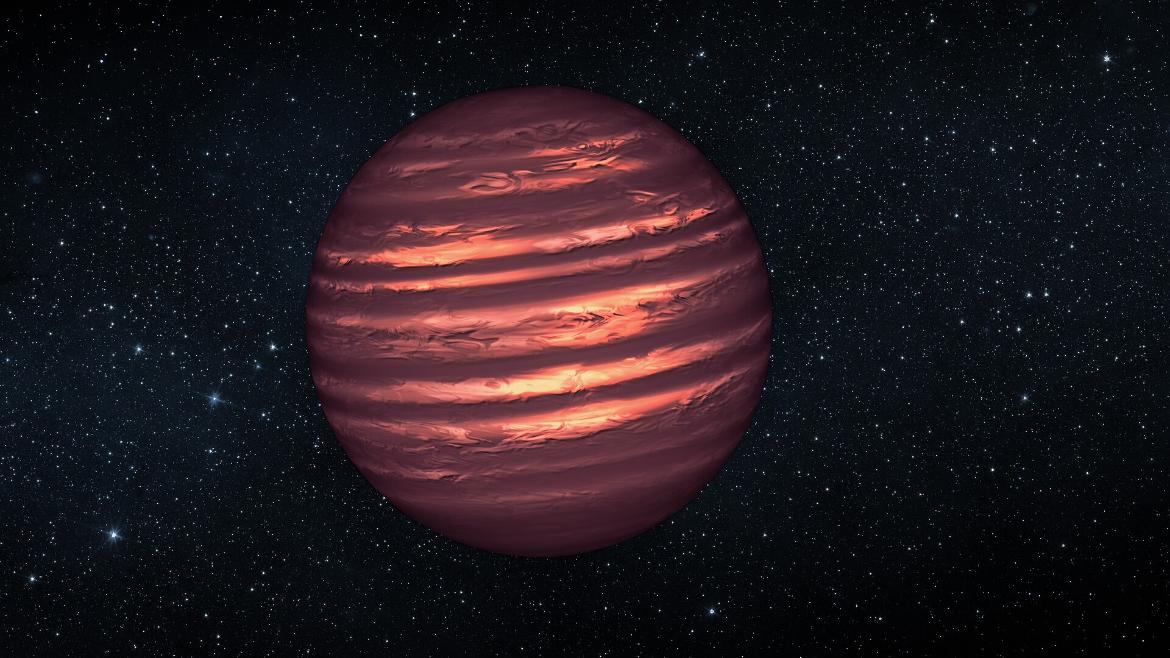PhD Opportunities
Transiting brown dwarfs in the era of PLATO
Supervisor: Dr David BrownLink opens in a new window
Anticipated start date: October 2026
Summary: In this project you will explore the fascinating world of brown dwarfs, using data from both space-based and ground-based observatories to study these mysterious objects.
Applications for this position are now CLOSED.
If you are interested in future opportunities for a PhD at Warwick, please keep an eye on the Warwick Department of Physics postgraduate admissions pagesLink opens in a new window.

Image Credit: NASA/JPL-Caltech
Brown dwarfs are sub-stellar objects. Their central temperature and pressure is high enough to initiate a short-lived deuterium-burning phase, distinguishing them from most gas giant planets, but is insufficient for main-sequence hydrogen fusion.
The first brown dwarf was only discovered in 1995Link opens in a new window, and they remain rather elusive objects due to their small sizes and low luminosities. However, brown dwarfs are expected to be ubiquitous, with an estimated 25-100 billion in our galaxyLink opens in a new window. These fascinating objects are key astrophysical laboratories; their uncertain origins make them excellent case studies for star- and planet-formation pathways, while their similar properties to giant exoplanets make them powerful proxies for carrying out atmospheric studies.
Of particular interest are transiting brown dwarfs, the population of which has grown rapidly in recent years, largely thanks to discoveriesLink opens in a new window using data from NASA’s Transiting Exoplanet Survey Satellite (TESS ) mission. TESS's high-precision photometry, in combination with high-quality radial velocity observations, enables precise measurement of these objects' masses and radii. This, in turn, allows us to test internal structure models.
Astronomers have tended to define the mass range of brown dwarfs to be between ~13 to 80 times the mass of Jupiter. However, there is evidence that both of these limits are flexible, potentially varying by several Jupiter masses owing to differences in brown dwarf compositions. It is therefore important to have precise masses if we are to understand these objects. However, precise radii are just as important, not least because brown dwarfs are thought to shrink as they age. Thus, careful observation and modelling of brown dwarf transits can help us distinguish old from young.
The successful student will study known brown dwarfs using data from TESS and ground-based observatories to preceisely measure the objects' masses and radii, and carefully characterise their orbital parameters to probe their formation and evolution pathways. This will prepare the student for ESA's upcoming PLATOLink opens in a new window mission, scheduled to launch in December 2026 and begin providing data at the end of 2027. PLATO is likely to detect many new transiting brown dwarfs, as well as providing new observations of previously known brown dwarfs, and the expertise built up through the early stages of the project will see the student well-placed to exploit this data and improve our understanding of these enigmatic objects.
If you have any questions about the projects listed on this page, or would like to know more, please get in touch by emailLink opens in a new window.
Applications for this position are now CLOSED.
If you are interested in future opportunities for a PhD at Warwick, please keep an eye on the Warwick Department of Physics postgraduate admissions pagesLink opens in a new window.
At the University of Warwick, we strongly value equity, diversity and inclusion. The Physics Department will provide a healthy working environment, dedicated to outstanding scientific guidance, mentorship and personal development. We are committed to individuals with care giving duties and can offer flexible working hours.
Both the Physics Department and the University of Warwick hold Athena SWAN Silver awards, a national initiative to promote gender equality for all staff and students. The Physics Department is also a Juno Champion, which is an award from the Institute of Physics to recognise our efforts to address the under-representation of women in university physics and to encourage better practice for both women and men.
In Astronomy & Astrophysics we want all of our staff and students to feel welcome, safe, respected, valued, and supported during their time with the group. We strive to facilitate a working and learning environment in which all group members are treated fairly and with dignity and respect, and where bullying and harassment, of any kind, are not tolerated.
Accordingly, we are committed to upholding the University's ValuesLink opens in a new window, and all group members are expected to follow the University's Dignity PrinciplesLink opens in a new window.
